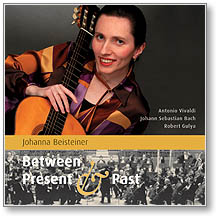 Johanna
Beisteiner - Johanna
Beisteiner -
Between Present and Past
Between Present and Past, the new album by the Austrian
guitarist Johanna Beisteiner, is a special medley
of works by distinguished composers of the past and contemporary music
by the highly talented
Hungarian composer Robert Gulya (*1973), who dedicated
two new works to Johanna Beisteiner: a Guitar Concerto and a Capriccio
for guitar
and piano.
"First I wanted to compose a cheerful concerto for Johanna,
but when I started to work on the first theme in late summer 2001
during
a stay in Los Angeles the terrible event of September
11 influenced my thoughts. For this reason all movements became rather
melancholic
and sensitive. I tried to realize most of my musical
ideas by using all technical possibilities of the guitar. That makes
this concerto
difficult and challenging even for highly skilled
players.
With the Capriccio I wanted to prove that a contemporary
guitar piece can be demanding and entertaining as well. Although the
guitar is only rarely combined with the piano, these two instruments
harmonize very well and give fresh and colourful sound to the composition.
Both pieces were written in order to show a broader
public that the classical guitar has a great potential
to become a real solo instrument in our concert life. After many years
of collaboration
I am convinced that both musically and technically
Johanna is the perfect artist to reach this aim."
Robert Gulya
In 1704 the only 19-year-old Johann Sebastian Bach composed the Capriccio
on the departure of the most beloved brother BWV 992. This piece is
supposed to have been written on the departure of Bach' s brother Johann
Jakob (1682-1722), who joined as an oboist the guard of the Swedish
King Charles XII in 1704 for taking part at the Great Nordic War. Originally
written for keyboard, the Capriccio was recorded on this CD in a new
arrangement by Robert Gulya for guitar and strings. This cast intensifies
the worried atmosphere and retains the intimate character of the original
version as well. The piece consists of six movements with following
subtitles: 1) Is a coaxing by his friends to dissuade him from his
jouney. 2) Is a picture of various calamities that might overtake him
in foreign parts. 3) Is a general lamentation of his friends. 4) Now
come the friends, since they see that it cannot be otherwise, and say
goodbye to him. 5) Air of the postilion. 6) Fugue in imitation of the
postilion' s horn.
Antonio Vivaldi composed his Concerto in D major
for lute, strings and cembalo. The lute was one of the most popular
instruments in the baroque age, but later it was replaced by the guitar.
Therefore the guitar takes the place of the lute also in this recording.
This CD was recorded in collaboration with several
great musicians from Budapest: the Hungarian Radio Symphony Orchestra,
the promising young conductor Domonkos Héja and the pianist
Wanda Mazalin.
Johanna Beisteiner has dedicated this recording to
her friends Robert Gulya and Paulino Bernabé.
guitar made by Paulino Bernabé (Imperial 2000) |










